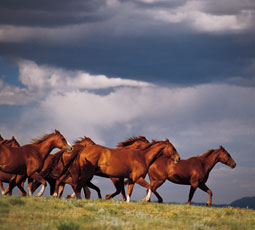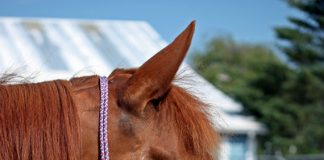
Residents of Moore, Okla., a suburb of Oklahoma City, suffered enormous losses when a mile-wide tornado tore through the area on Monday, leaving entire neighborhoods flattened and many residents without homes.
Where to Ride out the Storm
The first question that arises when discussing how to keep horses safe in a tornado is whether it is better to house them in the barn or to put them outside. There isn’t a single right answer to this question. Putting horses out in a large pasture will give them the opportunity to move out of the path of the storm, an option that stabled horses don’t have if the barn ends up in the path of a tornado. If you have a large, open pasture available, this is generally the best option.
However, for horses who are not accustomed to staying in a large pasture, it may be preferable to keep them in familiar surroundings to reduce anxiety. Furthermore, pastures with lots of trees or that are surrounded by objects that could be picked up by a tornado and turned into flying debris may not be safer than the barn.
Humans and pets should get out of the barn when a tornado warning is declared and into a basement or an interior room on the lowest level of a building.
Planning Ahead
Although hurricanes, floods and nor’easters can be devastating, horse owners affected by those natural disasters typically have some warning time to prepare. Tornadoes can appear with very little warning and their paths are unpredictable. For this reason, evacuating horses isn’t usually an option. However, if you live in a tornado-prone area, there are still steps you can take to be prepared.
Before tornado season begins, find a friend with a horse property or a commercial facility that will take on short-term boarders so that you will have somewhere to take your horse while you rebuild if your barn is damaged in the storm. Ideally, this facility will be far enough away that it is unlikely to be damaged in the same weather event, but close enough to be practical.
When a tornado warning is declared, put leather or breakaway halters or leather collars on every horse at your facility, and make sure each one has your phone number on it. If your barn or fences are damaged and your horses get loose, this will help increase the chances that they are returned to you quickly. Alternatively, some owners will write their phone number on their horse’s body with a grease pen. Halters may break or fall off, and there is a risk of your horse getting his halter caught on something and injuring himself, so using a different form of identification might be a better option.
After the Storm Passes
Once the tornado has passed, the risks are not yet over. The Centers for Disease Control and Prevention (CDC) recommends checking reports from a weather radio or local broadcasts to ensure the risk of tornadoes is over before you go outside to assess the damage. Here is the CDC’s list of post-storm reminders:
- Keep away from downed power lines and report them to your utility company.
- Stay out of damaged buildings and homes until local emergency management officials have indicated it is safe to go inside them
- If your home has not been damaged, keep children and pets inside, away from any damage or debris outside. If you must take your pets outside, keep them on a leash to prevent them from running away and being injured by debris.
- If your home is without power, use battery-powered flashlights and lanterns rather than candles to prevent accidental fires.
- Cooperate fully with local public safety officials and respond to request for volunteer assistance by police, firefighters and relief organizations, but do not enter damaged areas unless specifically asked to do so.
- If you suspect any damage to your home or barn, shut off electrical power, natural gas and propane tanks to avoid fire, electrocution or explosions.
- Wear sturdy shoes or boots, long sleeves and gloves whenever you handle, walk around or near debris. Many of the injuries caused by tornadoes result from stepping on nails in and around damaged homes and buildings.
- Clean up any dangerous spills immediately, including medicines, bleaches, chemicals, gasoline or other flammable liquids.
Further Reading
Horse Emergency Information
Staying Safe in a Tornado (from the CDC)







Great advice and great photo.
I have always thought it was better for a horse to be outside so natural instincts can help it survive good article and cool pic prayers for those in Oklahoma
great pic
Thank you for this. Recently, I have been thinking rather a lot about the best care for horses during a tornado. (naturally. I’m sure this is on every horse owners mind, after Oklahoma.)
Interesting! I hope that everyone had a nice weekend,is having a nice week,enjoyed the recent holidays that we’ve had and has a nice Memorial Day! That goes for last year and all the other years that I’ve missed.
I would prefer my horses are turned out on the road,gate closed behind them so they can run in what ever direction they wish. We can always find the later. A few hundred feet down a road might save their lives.
If in a pasture they are still contained and may not be able to run from the storm. Or the could run back into the barn or through a fence.
We have many plans in place depending on what the emergency is with our horses. Barn Fire,grass fire, forest fire, Electrical Storms, Severe weather, flooding. It is best to set down and write out your plan and besure everyone knows it and what to do if the need arises.
Just my thinking after 60 years of owning horses.
thank you so much for this.
good to be prepared
What about putting on boots with your phone number??